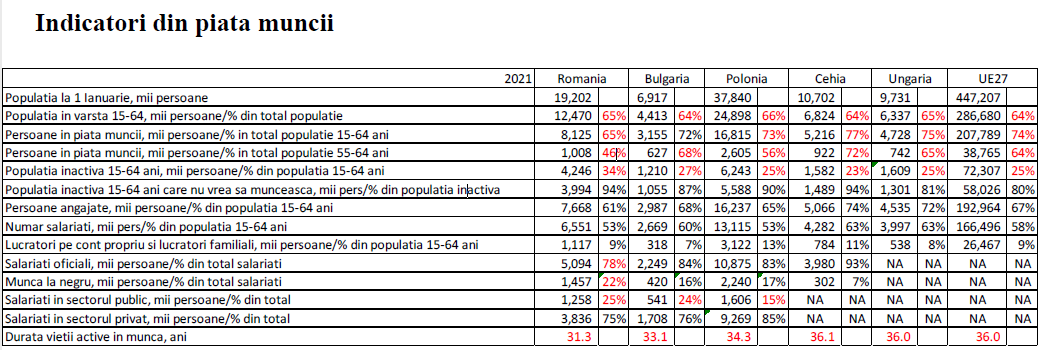
If we look closely at the labor market numbers, there are some things that point to serious structural problems, Ionuc Dumitru, chief economist at Raiffeisen Bank, said at a conference organized by the National Bank of Romania on Thursday.
We have a very high proportion of the inactive population
When we look at the active population in the labor market aged 15-64, we notice that in Romania we have a share of this in our age group of only 65%, which is the 2nd lowest share in the European Union after Italy, which is almost 10 percentage points below the European average, below the European average and significantly below other Central and Eastern European countries. Therefore, basically we have a rather large share of the so-called inactive population. This applies to pupils, students, pensioners, households, dependents of another person, the state or other organizations, explained Ionuts Dumitru on Thursday.
The decrease in population by one million people over 10 years is entirely related to the active population
According to the last census, we saw that the population of Romania decreased by one million in 10 years. Unfortunately, the decrease is entirely in the active population, that is, the inactive population has remained approximately at the same level, says the chief economist of Raiffeisen Bank.
Currently, less than one in two people work in Romania / 94% of those not in the labor market say they do not want to work
Less than one in two 55-64-year-olds in Romania are currently working, and those outside the labor market say 94% do not want to work.
The explanation for this situation is undoubtedly the relatively large number of special pensioners, pensioners aged a little over 40, Dumitru believes.
If you look at the last row of the table, active life expectancy in Romania is only 31.3 years, which is the lowest in the European Union.

Also, according to the figures in the table, only 53% of people who work are employed, including workers in the unobserved economy, and of these, only 78% pay taxes and fees, the rest are informal workers.
We have too little participation in economic activity, weak incentives to work, we have abuse of special pensions at a very young age
About 25% of employees who pay taxes work in the public sector. So, from these numbers, I would say that it is quite clear that we have a serious problem in the labor market, a structural problem, we participate too little in economic activity, the incentives to work are weak, we have special abuse. pensions at a very young age, people who retire too early, for the preparation of which the state has spent significant resources, allowing them to retire, probably at the peak of their professional life at the age of 45-50, explains the Romanian macroeconomist
We have too few workers and many other forms of income that are far more fiscally beneficial – see PFA, PFI, royalties, salary income disguised as micro-enterprise dividends.
We also have a lot of undeclared work, a lot of minimum wage workers in the economy
It is unbelievable to have 1,700,000 people on minimum wage in an economy of about 5 million taxpayers.
Why does the economy have such a high share of minimum wage earners? Probably also for the reason that many of these workers receive additional black payments from dividends that the company withdraws at a much lower tax cost than if it paid them these earnings in wages.
Solving problems in the labor market would mean a serious reform of the pension system as a whole and stimulation of the continuation of an active life, Ionuts Dumitru believes.
A fundamental rethinking of the special pension system, which today from many points of view is abusive, and a rethinking of fiscal incentives.
The tax burden on labor must be reduced. But not on any form of work, but on paid work, where the tax burden is indeed high, but at the same time the tax burden on other forms of income should be increased, where today the tax is much cheaper and the tax is being optimized very aggressively.
Many of these forms of income actually disguise salary income. Last but not least, I would say that we have not only poor fiscal motivation that encourages unethical behavior, but also aggressive optimization and very low fiscal discipline. We see companies that look miserable when you look at their financial performance. But shareholders are natural persons, very rich, there are many of them, – concludes the chief economist of Raiffeisen Bank.
Source: Hot News
Lori Barajas is an accomplished journalist, known for her insightful and thought-provoking writing on economy. She currently works as a writer at 247 news reel. With a passion for understanding the economy, Lori’s writing delves deep into the financial issues that matter most, providing readers with a unique perspective on current events.